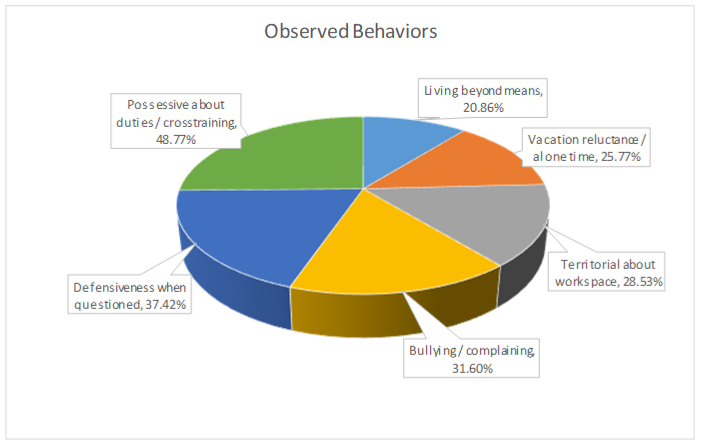More than 70% of practices will be embezzled sooner or later. As Prosperident performs hundreds of embezzlement investigations annually, we get face-to-face with the warning signs that are present when someone becomes a victim.
There are two places where these signs can appear; financial irregularities and how a thief behaves. While statistically, more embezzlement is identified through behavioral indicia, the presence of either category should be cause for concern, and the presence of both concurrently is a major danger signal.
If you have concerns about your practice, or wish to learn more about putting safeguards in place to protect you, click the box below.
What is your risk?
Behavioral Indicators
In a 2019 survey conducted by the ADA, dental embezzlement victims reported the following behaviors from thieves (please note that the total exceeds 100% due to thieves exhibiting multiple behaviors):

Territoriality, defensiveness, and a desire to have "alone time" at your practice are the three that we see frequently. Often, thieves are reluctant to go on vacation because being away is risky for them.
Others that we regularly observe that did not make it onto the ADA's list include:
- "Conspicuous displays of honesty" (where someone makes a point of telling or showing you how honest they are.
- Cutting corners. This may be the person the patient see as the "insurance whisperer" who can get things covered, or it may be the person who will move out of their apartment in the middle of their lease.
- Evident financial problems of the employee or someone who is living beyond their means.
- Patient complaints or enquiries re the accuracy of their accounts.
- A staff member who is unreasonably resistant to change or resists the involvement of outsiders, like consultants.
Financial Indicators

Here are some of the financial indicators that embezzlement could be taking place:
- Collections according to practice management software do not correspond with bank deposits.
- Day-end balancing not performed or not supervised by the practice owner.
- Accounts receivable higher than they should be or are not supervised by practice owner.
- Outstanding insurance claims are high or unsupervised.
- Collection ratio (annual collections divided by adjusted production) declines or adjustment ratio (annual total of adjustments divided by gross production) increases over time.
- Adjustments are high or cannot be satisfactorily explained.
- Bank deposits made infrequently. Having a bigger "float" of cash and checks facilitates embezzlement.
- Duties not properly divided. Overconcentration in the hands of someone who is territorial and will not delegate or cross-train.
After reading this, if you are a practice owner with concerns, please click below, and a member of our management team will respond.